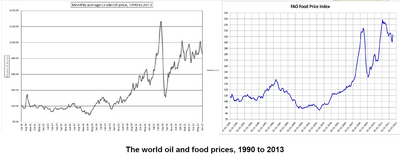Food and Water - Farming, Fracking, Fuel Land Use and Environment Policy Paper
Food and Water
Farming, Fracking, Fuel Land Use and Environment

Food and water security are global issues. Agriculture that relies on oilbased fertilisers means food prices leap around wildly along with the oil. We have passed the global production peak in conventional crude oil (according to the IEA chief economist, a fact concealed from the British public by the Labour government).
Unconventional sources of fossil fuels include fracking which has been shown to contaminate ground water.
The rush for biomass and cropbased biofuels is only making matters worse.
Meanwhile the Himalayan glaciers that supply the rivers in China and most of India, Pakistan and Bangladesh melt ever faster, threatening to cut off fresh water supplies to a third of the world's population.
LibDem policy:
- PP31 Policies on Genetic Modification (pub 1999)
4.3.1 Organic food is growing in popularity, and we wish to preserve the right of consumers to choose organic produce if they so wish. This freedom is potentially threatened by GM farming if crosspollination from GM crops proves to be an insuperable problem. (continues) - PP45 Local economies, local choice (pub 2001)
4.3.1 We support local produce being sold to local people through local outlets. This maintains money in the locality, cuts out food miles and provides the opportunity for people to buy fresh food that can often be special to its region saving energy as well as directing local resources at local people. - PP77 Green and Prosperous Communities (pub 2007)
4.1.3 includes: Support local markets and farmers markets using single regeneration grants for local shopping areas, to preserve a diversity of small local shops.
4.4.4 includes: Encourage local authorities, health trusts and schools to procure at least a third of the food they buy from healthy, local sources encouraging small suppliers, and discouraging transport pollution. - PP82 Zero Carbon Britain Taking a Global Lead (pub 2007)
4.5.3 ends: To minimise the risk of food shortages in developing countries it will be necessary to adopt policies such as prioritising the aid budget on stimulating indigenous food production and avoiding excessive incentives at home to convert food crops into biofuels.
4.6.10 ends: We will seek to increase the potential of soil as a carbon sink by promoting responsible soil management using Soil Management Plans. - PP92 - Thriving in a Globalised World (pub 2009)
4.2.6 The concept of 'air miles', or 'food miles', should be replaced by an agreed international label, or series of labels, for identifying 'environmental impact', covering key indicators such as embedded carbon, energy efficiency, impact on water resources, impact on biodiversity and recyclability. - PP113 - Propserous, Sustainable and Secure (pub 2013)
section 5.2 covers the topic in depth with relation to the EU.
5.2.3 The world has recently seen large fluctuations in prices of agricultural commodities. This volatility has been caused by increasingly unstable climatic conditions, coupled with increasing world demand for grainfed meat, rising oil prices, cropping for biofuels and market speculation.
Challenge magazine articles:
- 2007 Winter p15 What Use For Farmland
- 2008 Spring p5 A New Voice For Rural Britain
- 2008 Winter p15 GM The Great Divide
- 2009 Spring p15 GM Essential For The Future
- 2009 Summer p4 A Local Green Way Out Of Recession
- 2010 Spring p22 The Path To Transition
- 2011 Spring p22 GMOs Debate
- 2012 Summer p19 A Sustainable Future for Fish
- 2012 Autumn p18 Reserve Judgment
- 2013 Spring p22 First Step
- 2013 Summer p22 Bees in Crisis
- 2014 Spring p11 Speculating on Extinction
- 2014 Summer p22 E.coli a Modern Case of Hysteria?
Resources:
- The World Food Programme http://www.wfp.org/
- The Global Food Security Programme http://www.foodsecurity.ac.uk/
- The World Health Organisation food security programme http://www.who.int/trade/glossary/story028/en/
- Water Aid UK http://www.wateraid.org/uk
- The UN Water Programme http://www.unwater.org/
- UEA Water Security research centre https://www.uea.ac.uk/watersecurity
- Rob Hopkins' website on transition http://www.transitionnetwork.org/blogs/robhopkins
- f3 specialising in local food http://www.localfood.org.uk/
- Big Barn Community Interest Company http://www.bigbarn.co.uk/
- Sustainweb The alliance for better food and farming http://www.sustainweb.org/
- Slow Food global organization linking good food to community and the environment. http://www.slowfood.com/
- Farmers Markets http://www.farmersmarkets.net/
- Making Local Food Work a programme funded by the Big Lottery Fund http://www.makinglocalfoodwork.co.uk/
